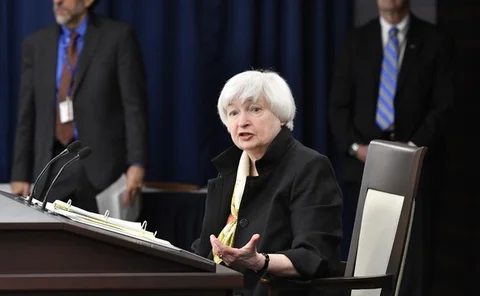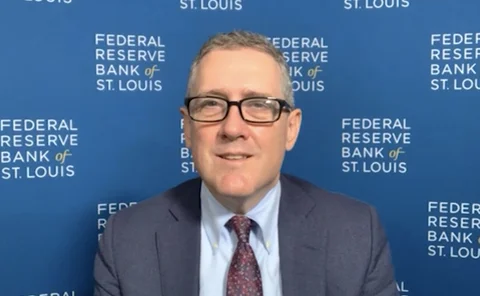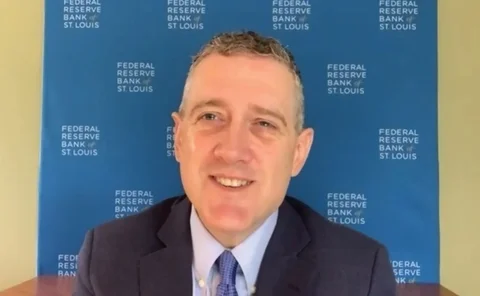Janet Yellen
(Un)stablecoins and central banks
Time to tackle stablecoin structures and support mechanisms
Banknotes: April to June 2022
A round-up of news and salient issues that have affected central bankers in the past three months
Yellen calls for new stablecoin regulation amid algorithmic crash
Terra, a leading stablecoin, lost its dollar peg as several crypto-assets fell
US Senate reappoints Powell as Fed chair
Appointment comes as Powell’s approval rating in polls falls to lowest point in his career
Yellen calls for IMF reform
US Treasury secretary says fund needs better “tools” to tackle crises as well as governance reform
Lifetime achievement: Stanley Fischer
Fischer has had a profound impact on monetary economics and central banking during his prolific career
‘Say what?’ Trust in central bank communications
Central banks are changing how they communicate with different audiences, but judging the success of these communication efforts is difficult
James Bullard on Fed policy, action and governance
St Louis president calls for tapering amid “exceptional” job market and risk of “more persistent” inflation, quantifies ‘big tent language’ for pioneering AIT move, and details Congress’s role in Fed ethics oversight
The IMF’s $650bn SDR allocation and a future ‘digital SDR’
Focus is needed on widening SDR use in payments and the creation of a ‘digital SDR’, to support a large allocation of ‘official’ IMF SDRs, writes Warren Coats
IMF executive board backs $650 billion SDR allocation
Allocation is set to be largest in the fund’s history, with launch expected in August
‘Run it hot’: the risks and rewards of a new policy era
Covid-19 has added impetus to an emerging intellectual shift in policy-making. But central banks face unresolved issues – on expectations, on fiscal policy, and on the capacity of the economy to ‘run hot’
A return of the inflation monster?
There are fears that a shift in intellectual approach towards running economies ‘hot’ could herald a return of the money-eating inflation era
Emerging-market central banks lead on women’s empowerment
EME central banks have more women at staff level and in senior positions, but there are deep disparities worldwide, with childcare availability appearing to be a major cause
IMF weighs up $650 billion SDR issuance
Figure would allow Biden administration to avoid a vote in Congress
Economics profession has a culture problem – Yellen
Former Fed chair says there is an implicit bias against women in economics
Yellen backs proposal for SDR issuance
G20 calls on IMF to develop proposal for “general allocation of SDRs”
Otmar Issing on the art of central bank communications
EMU architect speaks about Draghi’s “whatever it takes” intervention, forward guidance failures, the Fed’s average inflation target ‘miscommunication’, and why the ECB may be overreaching in its strategy review
Lessons from the Riksbank’s negative rates experiment
Sweden is the only nation to have implemented negative rates and then returned them to ‘normal’ territory. What can central bankers learn from the Swedish experience?
Biden to nominate Janet Yellen as Treasury secretary
Former Fed chair would become first person to have led central bank, Treasury, and Council of Economic Advisers
Influential Fed economist Thomas Laubach dies
Current and former Fed officials pay tribute to the US central bank’s German influencer, who died on September 2
Fed feeling its way with new inflation framework
Average inflation targeting is broadly dovish, and could see rates stay lower for even longer
Fed adopts average inflation target
Powell says FOMC will also allow employment to run above estimated maximum level
James Bullard on the Fed’s policy review, FSOC and forecasting jobs data
St Louis Fed president discusses his support for average inflation targeting, his concerns about US Treasuries market function, non-bank regulatory weakness and negative rates, as well as the unexpected success in using Homebase data to predict highly…
Fed’s safety nets are ‘fundamentally unsustainable’
The Fed’s new safety nets will allow “zombie companies” to thrive and drag down productivity; ever-increasing levels of interventions are “fundamentally unsustainable, intertemporally”, says William White























